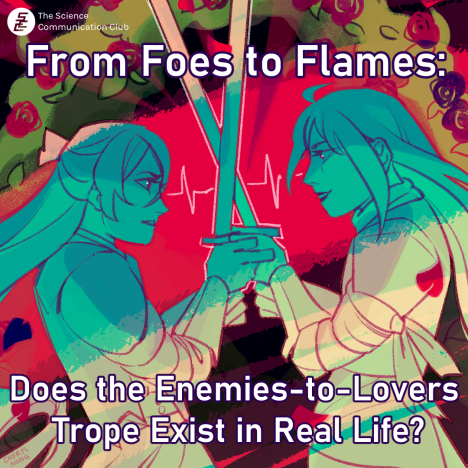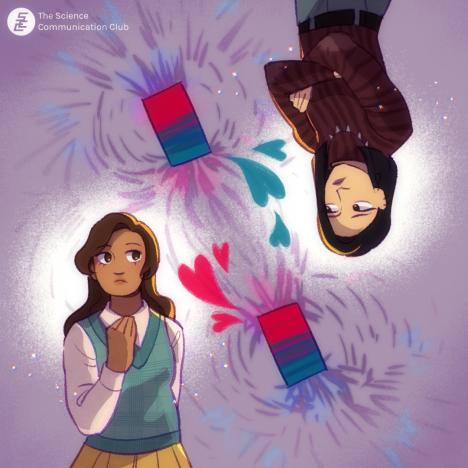
Written by Raisa Razzaque
Illustrated by Cheryl Nong
If you are a fervent reader of slow-burn romance novels, star-crossed enemies-to-lovers stories, rivalry, and similar exhilarating genres, you’ve likely come across the infamous idiom, “There’s a thin line between love and hate.” But how accurate is this phrase in reality? And is this phenomenon an actual occurrence beyond literature and pop culture?
Understanding the Allure Behind the Enemies-To-Lovers Trope
The gradual progression of loathing and hatred to romantic love between two characters is known as the notoriously popular “enemies-to-lovers trope.” Esteemed authors like Jane Austen and William Shakespeare have paved the trajectory for this romantic archetype with their renowned classics like Pride and Prejudice and The Taming of the Shrew. Modern executions of this trope are seen in books, like the Cruel Prince series, or movies such as The Proposal. But what is it about the dynamic between two sworn enemies, who have harboured decades of deep-rooted animosity and engaged in endless conflict with one another, that captivates us so profoundly? And better yet, why does this trope seem to consistently work so well with audiences?
Of course, the witty banter and the longing tension of this hate-to-love union stir a butterfly-in-our-tummy type of entertainment value. However, studies suggest that the appealing factor of such clichés extends far beyond mere showbiz. These tropes auspiciously stress that although the other party witnesses us at our absolute worst, they still accept us unconditionally.1 It’s no wonder this resonates so deeply with many individuals who may inadvertently seek acceptance of their self-perceived imperfections.
What facilitates this seamless transition from enemies into lovers? Psychologist and author Dr. Tony Ortego argues that passion is the single-standing force bridging these two sentiments together and enabling a unified execution. “With anger and passion, we can throw logic and caution out the window.”1 We see this vividly portrayed in the 1999 adaptation of the Taming of the Shrew, 10 Things I Hate About You, where Kat, the main protagonist, recites a poem to Patrick, whom she once considered an enemy, expressing “I hate the way you talk to me, and the way you cut your hair […], but mostly I hate the way I don’t hate you. Not even close, not even a little bit, not even at all.” A fan-favourite line in late 90’s cinema, impeccably capturing the intricate complexities of this dynamic without fail. It seems like passion is the perfect medium that encapsulates both intense feelings. Its pivotal role in the transition between the two emotions allows one to effortlessly morph into the other, hence blurring the lines between love and hate.

The Great Attraction Debate: Do Opposites Attract or Do Birds of a Feather Flock Together?
The foundation of the enemies-to-lovers trope is deeply rooted and built upon the notion of “opposites attract.” We see this often in more superficial, surface-level settings, where, for instance, the book nerd falls for the egotistic jock or the delinquent is enthralled by the goody-two-shoes. But there are a few theories that suggest why this so-called law of attraction exists at a deeper level. One presumes that we are inevitably drawn to the characteristics we dislike within ourselves.2 Unbeknownst to us, we may subconsciously select significant others who mirror these qualities with hopes to build those aspects within ourselves. Another theory proposes that we are attracted to what is out of the ordinary.2 We are drawn to individuals with opposing qualities, as the idea of being with an unconventional partner can be thrilling and enticing, especially if we perceive our lives as mundane and uneventful.
So, do we tend to fall in love with the people we “hate”? Is this so-called popularized media trope also a real-life occurrence? Contrary to popular belief, this entire notion of liking individuals with opposing characteristics to us is largely a myth. The overwhelming body of evidence suggests that we tend to like individuals more similar to us. Psychologist Don Byrne first studied this with the “stranger technique”, a process which he developed to explore this phenomenon further.3 In the study, the participants filled out a survey encompassing various subject areas, including themes we may not necessarily associate with love and romance. They then assessed the responses of a fictitious person to the same questionnaire known as the “person-perception” phase. Byrne discovered that individuals were more attracted to those with comparable attitudes.3
Likewise, another study analyzed the digital footprints of more than 45,000 people to identify corresponding personalities.3 Researchers found that individuals with similar traits were more inclined to develop stronger platonic and romantic relationships.3 These studies concluded that we tend to favour beliefs that endorse consistency, so it only makes sense that people who share our views are inherently the ones we gravitate towards. Still, it is important to keep in mind that similarity is not the end-all-be-all. Psychologist Arthur Aron provides a fresh perspective to this debate. He contends, that while similarity is crucial, it can sometimes hinder attraction.3 As humans, we are designed to seek out self-improvement with the desire to build ourselves. Thus, we form relationships with others to ascertain some of these qualities.
It’s an unfortunate time (and reality-check) for hopeless romantics yearning to live out their enemies to lovers’ fantasies. While it would make a very entertaining, “this is how we met” story, the science simply suggests otherwise. Opposites quite infrequently attract; we’re better off finding people who share similar qualities to us while also offering the potential for personal development. So, the next time you need a quick pick-me-up, instead of seeking out partners with opposing characteristics, put on 10 Things I Hate About You and indulge to your heart’s content!
Sources:
- Mitra D. 2022 Nov 5. Dissecting the “enemies to lovers” trope in media. Her Campus | Created for Gen Z, By Gen Z. https://www.hercampus.com/school/delhi-south/dissecting-the-enemies-to-lovers-trope-in-media/
- Why Do We Fall In Love With People We Hate? 2023. Reeditionmagazinecom. https://www.reeditionmagazine.com/to-the-minute/why-do-we-fall-in-love-with-people-we-hate.
- ‘Swami V. 2017 Mar 24. Why opposites rarely attract. The Conversation. https://theconversation.com/why-opposites-rarely-attract-74873#:~:text=For%20decades%2C%20psychologists%20and%20sociologists,the%20early%20stages%20of%20relationships.